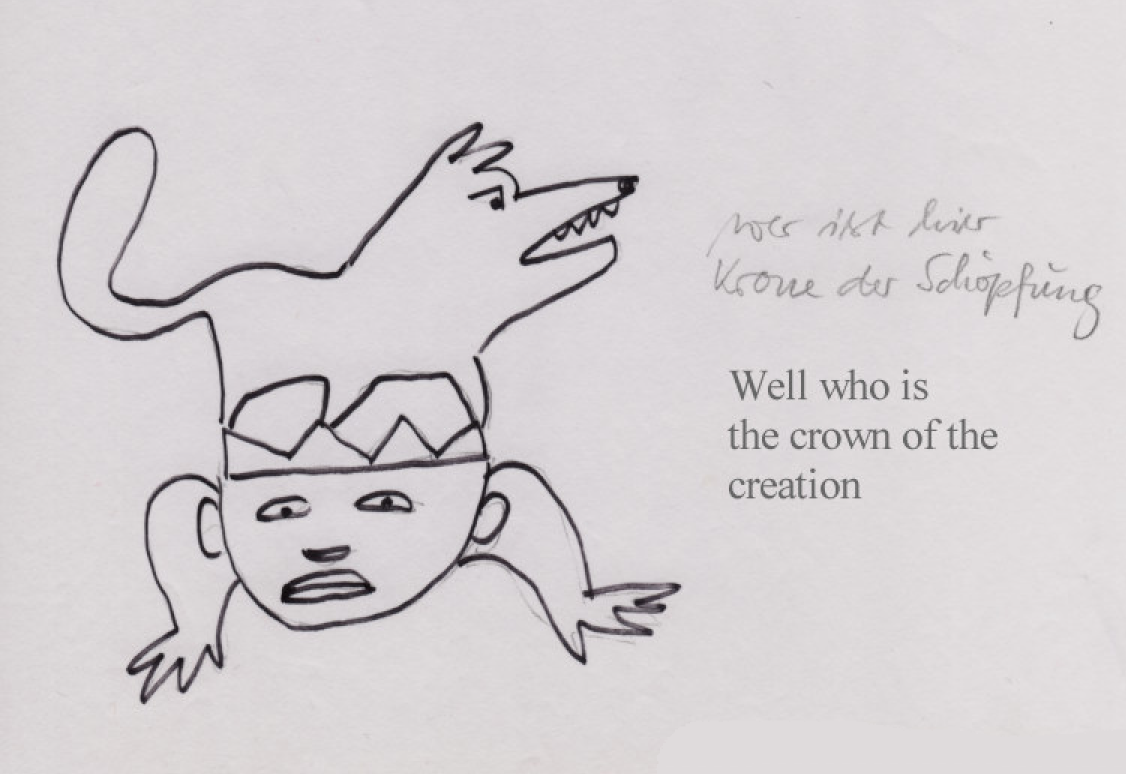
A revised version of this fragment is contained in > https://farangis.de/reader/edition_farangis_animal_autonomy_reader_2023_1.pdf
The „Neverunderstanding“ – or simply the last layer of Animal Objectification?
LANGUAGE, COMMUNICATION, Animal Sociology and Animal Objectification
You can read this as hate speech, because it is.
Some people, or many or most people are simply not willing to quit applying either: biologism or a detouring language about possible intersocial perspectives and lived experiences in regards to Nonhumans and the problematics they are facing.
The subject
as a ‘social unit’
overcomes the category of species
> perspective of interest > Yarbrough > how did the concept or species arise …
“Race and species are arbitrary distinctions that arose around the same time in European thought. They are both driven by phenotypic differences but carry the weight and legitimacy as though they are biologically rooted, and biological is often associated with “fixed.” In biology, the biological species definition is considered the ultimate species definition. If groups are shown to have individuals producing reproductively viable offspring, then they are truly a species. More often than not, this primary definition is too difficult to test in the field or in the lab, so other definitions based on morphological and phylogenetic differences between groups are considered an acceptable substitution. But what the morphological and phylogenetic species definitions do is make the labeling of species just as arbitrary as race theory. For both, it basically comes down to: if you look a little different, do things a little differently, vary somewhat genetically, and even live in a different region from the basis of comparison, that’s good enough to label your group a distinct species (and historically, race and species have been used interchangeably) until some other “expert” comes along and says otherwise.” YARBROUGH, Anastasia: White supremacy and patriarchy hurts animals, 2015, talk held at first Sistah Vegan conference (German translation > E-Reader: Gruppe Messel, Jahrgang 2, Nr. 4, S. 3, 2020, https://d-nb.info/1215819366/34, we will archive the original English version, which so far is published on our website at https://www.simorgh.de/objects/yarbrough-white-supremacy-and-patriarchy-hurt-animals/ at the DNB too.)
Again, on whichever foot you wish to put it:
The subject as a ‘social unit’ overcomes the category of species; so I call the encounter (direct and indirect, contextualized) inter-social and speak of inter-social contexts between ‘social units’.
As ‘subjects’ we go into a form a ‘social’ exchange and encounter. Mind: the setting of encounter and thus contextualization can be seen either in contexts that apply a human-hegemonic claim, or it can be different than that … leaving open space.
The notion of species is a biologism. And yes: Life is obviously manifold.
We act as if the only form of objectifying and defining bodies and lives which categorically never implies biologism, is when we come to talk about and act in regards to Nonhumans and Nonhuman Natural Entities.
We at least agree to understand many Nonhuman lives as “living entities/organisms”).
We pour the baby out with the water when it comes to differentiation. That we cannot avoid any harm and that we are far from a legislative logic that sees Animal Subjects and Earth Rights, etc. does not mean we can just keep drawing the old line of some idea of human hegemony and nonhuman disposability.
Biologism:
“Biology and ethology have somehow become the sciences of animalkind. It is from these sciences that social scientists (the sciences of humankind) uncritically and largely unwittingly derive their own image of animals and animalness. Animals have become associated with biological and genetic explanations.” NOSKE, Barbara, The Animal Question in Anthropology: A Commentary, Society and Animals 1 (2):185-190 (1993), https://philpapers.org/rec/NOSTAQ
A rhetoric of justice
Try for once to speak about animal issues without biologizing the concrete individual animal subjects or groups or cultures … , without metaphorizing them, without secondarizing them, without applying degrading frameworks of human enacting some kind of definitory or descriptive hegemony over a realm outside of their helpful and parallel damaging combative … intra-social interests.
The way in which we shaped our speech about animal issues and about animal subjects/individuals/groups/cultures/contexts … created and shaped our own image of them. Which is quite disabling in this society.
Unless we learn to speak differently, to critically conceptualize differently, by putting things into perspective, we – basically solely as members of the species “human” – will not be able to grow up to become a valid member of this place we are allowed to live in qua life.
We are not automatically tied to be so conformist, we don’t have to stick to an exclusive “human” collectivity and an exclusive idea of forced similarity in out outlooks and understandings …, and this is why we here are angry and call people responsible for incessantly being incoherent about their aims when they unlock their inner forms of animal oppression and thus keep running around with this extremely thick worldview … .
Gruppe Messel
